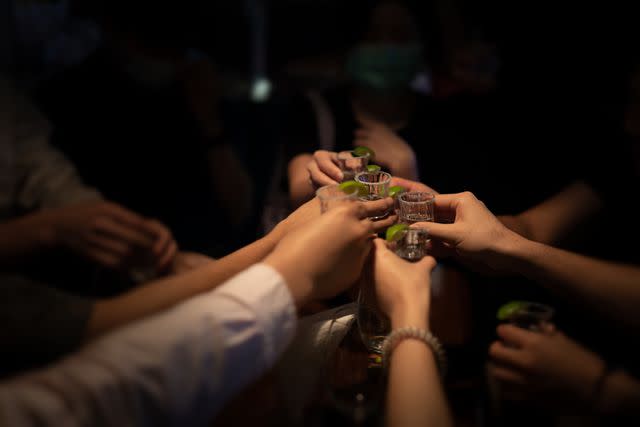Mixing Alcohol and Zoloft: The Risks of Drinking With SSRIs
Medically reviewed by Femi Aremu, PharmD
Zoloft (sertraline) is an antidepressant prescribed to help people with depression, anxiety, and other mental health conditions. It belongs to a group of medicines called selective serotonin reuptake inhibitors, or SSRIs.
SSRIs like Zoloft have the potential to interact with alcohol, increasing the risk of negative adverse effects, such as dizziness or sleepiness. For this reason, you should avoid drinking alcohol while using Zoloft.
This article will explore the effects of combining alcohol and antidepressants like Zoloft.

Getty Images / Jackyenjoyphotography
Alcohol & Antidepressants: What Are the Risks?
Every medication has side effects. For SSRIs like Zoloft, alcohol can enhance these side effects further. It's important to understand the risks before starting treatment.
In general, side effects of Zoloft include:
Diarrhea
Nausea
Dry mouth
Dizziness
Sleepiness
Fatigue
Difficulty sleeping
Drinking alcohol while taking antidepressants can enhance the above side effects and cause additional reactions. Moreover, alcohol can negatively affect how antidepressants work. Drinking alcohol can make the antidepressants less effective and interfere with treatment.
Besides reducing effectiveness, alcohol can make you feel more tired, dizzy, or sick when consumed with antidepressants.
Alcohol can also affect mood. Furthermore, mixing alcohol and Zoloft can lead to trouble reacting and thinking clearly.
Safety Warning
Zoloft is associated with serotonin syndrome, a rare but severe side effect that can occur while taking an SSRI. Serotonin syndrome occurs due to having too much serotonin. Symptoms of serotonin syndrome include anxiety, restlessness, confusion, tremor, and delirium.
SSRIs like Zoloft also come with a boxed warning due to the increased risk of suicidal thoughts or behaviors when used in adolescents and young adults.
Can You Drink Alcohol Safely While Taking Zoloft?
You may wonder whether there is a safe way to drink alcohol while taking Zoloft.
Limited research exists on how drinking small amounts of alcohol with Zoloft will affect you. Moreover, alcohol and Zoloft can affect each person differently.
In general, it's not a good idea to consume alcohol while taking antidepressants. Therefore, it's best to steer clear of alcohol altogether to be safe.
Side Effects of Mixing Alcohol & Zoloft
Here are some possible side effects of mixing alcohol and Zoloft:
Nausea
Dizziness
Tiredness
Mood changes
Trouble thinking clearly
Sleep problems
Impaired coordination
It's very important to be careful about mixing alcohol with any medicine. To stay safe and make sure your medicine works the way it should, it's best to avoid alcohol while you're taking Zoloft. If you have any questions or concerns, it's always a good idea to talk to your healthcare provider.
Does Alcohol Affect Depression?
Yes, alcohol use can affect depression.
Several factors can contribute to depression, including brain chemistry imbalance, genetics, life events, and negative thought patterns. However, drinking alcohol can exacerbate symptoms of depression.
Alcohol affects the brain in various ways and is considered a depressant. It disrupts the balance of neurotransmitters in the brain that control emotions, which results in psychological changes. It does this by affecting serotonin levels in the brain. While alcohol might make a person feel better for a short while, it can make them feel worse in the long run.
The more alcohol you consume, the higher the likelihood it'll affect these neurotransmitters in the brain and worsen mental health conditions like depression or anxiety.
Some people may turn to alcohol to cope with feelings associated with depression or just the occasional drink in social settings. However, there are plenty of alternatives to drinking alcohol.
Here are some options:
Drink water: Staying hydrated can help you feel refreshed.
Find substitutes: In social situations where alcohol is the norm, try nonalcoholic alternatives, such as juice, sparkling water, or tea.
Exercise: Being physical can release endorphins, a feel-good chemical.
Find support: Spend time with friends or family, join a support group, and do more activities that don't revolve around alcohol.
Mindfulness and meditation: If stress contributes to your drinking, try practicing mindfulness and meditation.
Remember, the key is to find activities that you enjoy and that align with your interests and values. Prioritize what’s best for your health, and choose options to help your well-being.
Find Help
If you or a loved one is struggling with substance use or addiction, contact the Substance Abuse and Mental Health Services Administration (SAMHSA) National Helpline at 800-662-4357 for information on support and treatment facilities in your area.
For more mental health resources, see our National Helpline Database.
When to Talk to Your Healthcare Provider
Zoloft is one of many antidepressants. If this medication isn't working for you, discuss your options with a healthcare provider to find the best treatment possible.
Contact a healthcare provider if you are experiencing unwanted or severe side effects, such as signs of serotonin syndrome or worsening mental health (such as suicidal thoughts).
People with depression may turn to alcohol to try to feel better in the short term; however, alcohol can worsen their condition. If you find it difficult to avoid drinking, you should reach out to your provider for guidance. Consider behavioral therapies to learn about coping with stress without using alcohol, or seek out support groups.
Summary
Zoloft is an SSRI antidepressant used to treat symptoms of depression and anxiety. Sometimes, Zoloft might cause side effects like feeling sick, dizzy, or tired, which may be enhanced by drinking alcohol. For this reason, you should not drink alcohol while taking it.
Alcohol can also make a person’s anxiety and depression worse, which is why it's beneficial to avoid drinking alcohol if you have a mental health condition.
If you have trouble avoiding alcohol, consult a healthcare provider or licensed therapist.
The author would like to recognize and thank Norma Ponce, PharmD, MHA, for contributing to this article.
Read the original article on Verywell Health.

